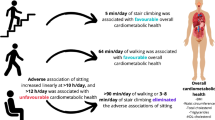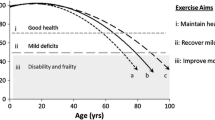Abstract
This study is aimed to evaluate whether circulating adiponectin concentration is associated with physical activity (PA) level in healthy older females. To date, daily PA in older adults (≥65 years) has primarily relied on self-report. This study used accelerometry, which objectively measured minute-by-minute movement to assess PA volume and intensity performed by elderly females. In addition, body composition, leptin and insulin resistance values were measured to assess the influence of these parameters on the possible relationship between adiponectin and PA levels in this specific age group of older women. On 49 women (mean age: 73.6 ± 4.2 years), adiponectin, leptin, insulin resistance, body composition and 7-day PA parameters were measured. Average daily accelerometer step counts and time spent in different PA levels were obtained from 7-day PA measurement. Average daily accelerometer step-count was 7,722 ± 3,069 steps day−1 and the recommended 150 min weekly of at least moderate/vigorous PA in bouts of at least 10 min was achieved by 71.4% (35/49) of the participants. Correlation analysis showed that plasma adiponectin concentration (16.0 ± 6.1 μg ml−1 ) was related (P < 0.001) to steps per day (r = 0.438) and leptin (r = −0.443) values. Multivariate regression analysis further revealed that only steps per day and leptin were independent predictors of circulating adiponectin concentration in healthy elderly females. In conclusion, these data support the hypothesis that being physically active is associated with better adiponectin concentration and a reduced risk of having metabolic disease risk in the specific group of healthy elderly females.
Similar content being viewed by others
References
Aoyagi Y, Shephard RJ (2009) Steps per day: the road to senior health? Sports Med 39:423–438
Bassett DR Jr, Ainsworth BE, Swartz AM, Strath SJ, O′Brien WL, King GA (2000) Validity of four motion sensors in measuring moderate intensity physical activity. Med Sci Sports Exerc 32(Suppl. 9):S471–S480
Bertoli S, Magni M, Krogh V, Ruscica M, Dozio E, Testolin G, Battezzati A (2006) Is ghrelin a signal of decreased fat-free mass in elderly subjects? Eur J Endocrinol 155:321–330
Bravata DM, Smith-Spangler C, Sundaram V, Ginger AL, Lin V, Lewis R, Stave CD, Olkin I, Sirard JR (2007) Using pedometers to increase physical activity and improve health: a systematic review. JAMA 298:2296–2304
Cnop M, Havel PJ, Utzschneider KM, Carr DB, Sinha MK, Boyko EJ, Retzlaff BM, Knopp RH, Brunzell JD, Kahn SE (2003) Relationship of adiponectin to body fat distribution, insulin sensitivity and plasma lipoproteins: evidence for independent roles of age and sex. Diabetologia 46:459–469
Davis MG, Fox KR (2007) Physical activity patterns assessed by accelerometry in older people. Eur J Appl Physiol 100:581–589
Dekker JM, Funahashi T, Nijpels G, Pilz S, Stehouwer CDA, Snijder MB, Bouter LM, Matsuzawa Y, Shimomura I, Heine RJ (2008) Prognostic value of adiponectin for cardiovascular disease and mortality. J Clin Endocrinol Metab 93:1489–1496
Ekelund U, Tingstrom P, Kamwendo K, Krantz M, Nylander E, Sjöstrom M, Bergdahl B (2002) The validity of the computer science and applications activity monitor for use in coronary artery disease patients during level walking. Clin Physiol Funct Imaging 22:248–253
Freedson PS, Melanson E, Sirard J (1998) Calibration of the Computer Science and Applications, Inc. accelerometer. Med Sci Sports Exerc 30:777–781
Gavrila A, Chan JL, Yiannakouris N, Kontogianni M, Miller LC, Orlova C, Mantzoros CS (2003) Serum adiponectin levels are inversely associated with overall and central fat distribution but are not directly regulated by acute fasting or leptin administration in humans: cross-sectional and interventional studies. J Clin Endocrinol Metab 88:4823–4831
Hagströmer M, Oja P, Sjöström M (2007) Physical activity and inactivity in an adult population assessed by accelerometry. Med Sci Sports Exerc 39:1502–1508
Harris TJ, Owen CG, Victor CR, Adams R, Cook DG (2009) What factors are associated with physical activity in older people, assessed objectively by accelerometry? Br J Sports Med 43:442–450
Hulver MW, Zheng D, Tanner CJ, Houmard JA, Kraus WE, Slentz CA, Sinha MK, Pories WJ, MacDonald KG, Dohm GL (2002) Adiponectin is not altered with exercise training despite enhanced insulin action. Am J Physiol Endocrinol Metab 283:E861–E865
Huypens P (2007) Leptin controls adiponectin production via the hypothalamus. Med Hypoth 68:87–90
Isobe T, Saitoh S, Takagi S, Takeuchi H, Chiba Y, Katoh N, Shimamoto K (2005) Influence of gender, age and renal function on plasma adiponectin level: the Tanno and Sobetsu study. Eur J Endocrinol 153:91–98
Janney CA, Richardson CR, Holleman RC, Glasheen C, Strath SJ, Conroy MB, Kriska AM (2008) Gender, mental health service use and objectively measured physical activity: data from the National Health and Nutrition Examination Survey (NHANES 2003–2004). Ment Health Phys Act 1:9–16
Jürimäe J, Jürimäe T (2006) Influence of insulin-like growth factor-1 and leptin on bone mineral content in healthy premenopausal women. Exp Biol Med 231:1673–1677
Jürimäe J, Jürimäe T (2007) Plasma adiponectin concentration in healthy pre- and postmenopausal women: relationship with body composition, bone mineral, and metabolic variables. Am J Physiol Endocrinol Metab 293:E42–E47
Jürimäe J, Jürimäe T, Ring-Dimitriou S, LeMura LM, Arciero PJ, von Duvillard SP (2009a) Plasma adiponectin and insulin sensitivity in overweight and normal weight middle-aged premenopausal women. Metabolism 58:638–643
Jürimäe J, Kums T, Jürimäe T (2009b) Adipocytokine and ghrelin levels in relation to bone mineral density in physically active older women: longitudinal associations. Eur J Endocrinol 160:381–385
Jürimäe J, Kums T, Jürimäe T (2009c) Plasma ghrelin concentration is a signal of decreased fat free mass in healthy elderly females. Am J Hum Biol 21:404–406
Kanaley JA, Sames C, Swisher L, Swick AG, Ploutz-Snyder LL, Steppan CM, Sagendorf KS, Feiglin D, Jaynes EB, Meyer RT (2001) Abdominal fat distribution in pre- and postmenopausal women: the impact of physical activity, age and menopausal status. Metabolism 50:976–982
Kizer JR, Barzilay I, Kuller LH, Gottdiener JS (2008) Adiponectin and risk of coronary heart disease in older men and women. J Clin Endocrinol Metab 93:3357–3364
Matsuzawa Y, Funahashi T, Kihara S, Shimomura I (2004) Adiponectin and metabolic syndrome. Arterioscler Thromb Vasc Biol 24:29–33
Matthews DR, Hosker JP, Rudenski AS, Naylor BA, Treacher DF, Turner RC (1985) Homeostasis model assessment: insulin resistance and beta-cell function from fasting plasma glucose and insulin concentrations in men. Diabetologia 28:412–419
Ryan AS, Berman DM, Nicklas BJ, Sinha M, Gingerich RL, Meneilly GS, Egan JM, Elahi D (2003) Plasma adiponectin and leptin levels, body composition, and glucose utilization in adult women with wide ranges of age and obesity. Diabetes Care 26:2383–2388
Sattar N, Watt P, Cherry L, Ebrahim S, Davey Smith G, Lawlor DA (2008) High molecular weight adiponectin is not associated with incident coronary heart disease in older women: a nested prospective case-control study. J Clin Endocrinol Metab 93:1846–1849
Snijder MB, Heine RJ, Seidell JC, Bouter LM, Stehouwer CDA, Nijpels G, Funahashi T, Matsuzawa Y, Shimomura I, Dekker JM (2006) Associations of adiponectin levels with incident impaired glucose metabolism and type 2 diabetes in older men and women. Diabetes Care 29:2498–2503
Talbot LA, Gaines JM, Huynh TN, Metter EJ (2003) A home-based pedometer-driven walking program to increase physical activity in older adults with osteoarthritis of the knee: a preliminary study. J Am Geriatr Soc 51:387–392
Tudor-Locke CE, Myers AM (2001) Methodological considerations for researchers and practitioners using pedometers to measure physical (ambulatory) activity. Res Q Exerc Sport 72:1–12
Yamauchi T, Kadowaki T (2008) Physiological and pathopysiological roles of adiponectin and adiponectin receptors in the integrated regulation of metabolic and cardiovascular diseases. Int J Obes 32:S13–S18
Yamauchi T, Kamon J, Waki H, Terauchi Y, Kubota N, Hara K, Mori Y, Ide T, Murakami K, Tsuboyama-Kasaoka N, Exaki O, Akanuma Y, Gavrilova O, Vinson C, Reitman ML, Kagechika H, Shudo K, Yoda M, Nakano Y, Tobe K, Nagai R, Kimura S, Tomita M, Froguel P, Kadowaki T (2001) The fat-derived hormone adiponectin reverses insulin resistance associated with both lipoatrophy and obesity. Nat Med 7:941–946
Yu Z, Ye X, Wang J, Qi Q, Franco OH, Rennie KL, Pan A, Liu Y, Hu FB, Lin X (2009) Associations of physical activity with inflammatory factors, adipocytokines, and metabolic syndrome in middle-aged and older Chinese people. Circulation 119:2969–2977
Acknowledgments
This study was supported by Estonian Science Foundation Grant GKKSP 6638.
Author information
Authors and Affiliations
Corresponding author
Additional information
Communicated by Klaas Westerterp.
Rights and permissions
About this article
Cite this article
Jürimäe, J., Kums, T. & Jürimäe, T. Plasma adiponectin concentration is associated with the average accelerometer daily steps counts in healthy elderly females. Eur J Appl Physiol 109, 823–828 (2010). https://doi.org/10.1007/s00421-010-1423-9
Accepted:
Published:
Issue Date:
DOI: https://doi.org/10.1007/s00421-010-1423-9




